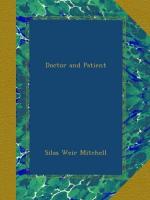Let us return to the causes of this sad condition. It is a common mistake to suppose that the well and strong are not liable to onsets which cause nervousness. As a rule, they rarely suffer; but we are neatly ballasted, and some well people are nearer to the chance of being so overturned than it is pleasant to believe. Thus it is that what for lack of a better name we call “shock” is at times and in some people capable of inflicting very lasting evil in the way of nervousness.
We see this illustrated in war in the effects of even slight injuries on certain people. I have known a trivial wound to make a brave man suddenly timid and tremulous for months, or to disorder remote organs and functions in a fashion hard to understand. In the same way, a moral wound for which we are not prepared may bring about abrupt and prolonged consequences, from which the most robust health does not always protect us; and which is in proportion disastrous if the person on whom it falls is by temperament excitable or nervous. I have over and over seen such shocks cause lasting nervousness. I knew a stout young clerk who was made tremulous, cowardly, sleepless, and, in the end, feeble, from having at a funeral fallen by mishap into an open grave. I have seen a strong woman made exquisitely nervous owing to the fall of a wall which did her no material damage. Earthquakes cause many such cases, and bad ones, as we have had of late sad occasion to know. The sudden news of calamity, as of a death or financial disaster, has in my experience made vigorous people nervous for months. A friend of mine once received a telegram which rather brutally announced the disgrace of one dear to him. He had a sense of explosion in his head, and for weeks was in a state of nervousness from which he but slowly recovered. There is something in cases like his to think about. The least preparation would have saved him, and we may be sure that there is wisdom in the popular idea that ill news should be gently and guardedly broken to such as must bear it. To be forewarned is to be forearmed we say with true wisdom.
Prolonged strain of mind and body, or of both, is another cause apt to result in health failures and in nervousness as one attendant evil. The worst one I know is to nurse some person through a long disease. Women are apt to think that no one can so well care for their sick as they. Intrusion on this duty is resented as a wrong done to their sense of right. The friend who would help is thrust aside. The trained nurse excites jealous indignation. The volunteer gives herself soul and body to the hardest of tasks, and is rather proud of the folly of self-sacrifice. How often do we hear a woman say with pride, “I have not slept nor had my clothes off for a week.” She does not see that her very affection unfits her for the calm control of the sick-room, and that her inevitable anxiety is incompatible with tranquil judgment. If you tell her that nursing is a profession, and that the amateur can never truly fill the place of the regular, she smiles proudly, and thinks that affection is capable of all things, and that what may be lost in skill will be made up in thoroughness and compensated by watchfulness, such as she believes fondly only love can command. It is hard to convince such a woman.




